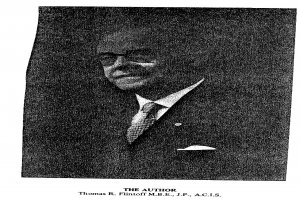Thomas R. Flintoff (1904-1994): Life Writing, Class & Identity
The memoir titled ‘Friday The Thirteenth Of May’ (Thomas R. Flintoff, date unknown) best fits into the political narrative form. This is defined by Regenia Gagnier as being written by those with strong political views who associate more with the working-class.[1] As a working-class Conservative, Flintoff was involved in politics from an early age when he joined the Junior Conservative Association. As well as containing his own political views, Flintoff also describes how the world changed throughout his life time and explains how he had no choice but to change with it. Gagnier states that autobiographical working-class political narratives ‘assert the world changing and the worker’s adequacy to change.’ (Gagnier, p. 349)
In the memoir Flintoff discusses his life between 1904 -1939. Throughout this period there were numerous political and social changes that took place with society. Flintoff explains the effects such changes had upon himself, his family and the working-class community. He discusses, for example, and the National Insurance Act that was brought into operation in 1913. The changes that Flintoff includes clearly reflect his identity and class position as he describes the struggles the working class experiences in order to adapt and overcome the expense of doctor and hospital fees. (For further information refer to my Politics, Protest and Class post)

Gagnier argues that political autobiographies often adopted the form of Bildungsroman. Flintoff does this too, opening with his earliest memory leading to joining the forces in 1939when ‘an unknown German political leader Adolf Hitler began making war-like speeches’ (Flintoff, p.35)
Flintoff never offers a reason as to why he sided with the Conservative Party during a time when Preston was represented by Labour. However, it may have been down to his emphasis on individual effort. Gagnier claims the ‘political narrative form is dedicated to one hero, one odyssey, and one battle.’ (Gagnier, 351) Flintoff’s narrative is very self-centred describing anecdotes in his life as well informing the reader of changes in society. Rather than writing on behalf of the working class, I believe Flintoff sees his own experience as representative of fellow members of his local community. However, he does recognize that other working-class people were not as fortunate as him and his mother to own their own house: ‘In those days it was very unusual for a house to be sold, and throughout the town could be seen quite a few number of houses ‘To Let’’ (Flintoff, p. 21)
Throughout his memoir Flintoff adopts a formal tone which proves to very informative. He does not show any signs of regret about his life and believes all his experiences as a child helped shape the person he turned out to be. ‘It was probably attendance at Sunday School and Church, together with the influence of a loving Christian home which developed my moral background, stimulating my thoughts and dominating my actions throughout my life’ (Flintoff, p.1) However, Flintoff’s memoir also celebrated the heroic efforts of one working class individual: his mother who had to cope with the difficulties of raising a child single handily after losing her husband, Flintoff’s dad so early in Flintoff’s life.
[1] Gagnier, Regenia. ‘Social Atoms: Working-Class Autobiography, Subjectivity and Gender’. Victorian Studies, 30.3 (1987), 335-363.


Leave a Reply